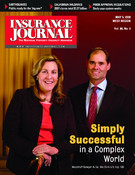Difference is tied to how mutual insurers build market share, Conning researcher says
When it comes to managing through a soft cycle, mutual companies behave in a way that is different than their stock-owned brethren, according to a new research report — and that could have a big impact on how agents deal with those insurers in industry down times.
The difference has to do with the way mutual insurers build their market share, said Stephan Christiansen, author the Conning Research report, “Property-Casualty Mutuals: Managing Through The Cycle.” In essence, Christiansen said, mutual insurers tend to grow by offering a more diverse range of products to relatively concentrated geographical areas. Conversely, stock-owned companies tend to grow by relatively fewer products to a far wider geography.
Mutuals are a major piece of the industry. Including the jumbo three — State Farm, Nationwide and Liberty Mutual — they represent about $135 billion in premium, roughly 30 percent of the property/casualty industry by premium volume. Excluding those three, mutuals account for $53 billion in premium, or about 12 percent of the industry.
Geography, it seems, plays a significant role in the health — and growth — of mutual companies. Although they tend to be less concentrated in fast-growing regions of the country, mutual companies actually grew faster overall than the rest of the industry in the last several years, Christiansen said. That growth was far stronger in commercial lines — it paralleled commercial lines growth by stock companies — than researchers initially expected.
But the chief difference between mutual and stock-owned companies, at least in terms of their behavior — has to do with the way their ownership structure influences their decision making. Because mutuals are membership-owned, they tend to have different missions and motivations, and their capital structure tends to be a little more constrained than that of stock companies, Christiansen said.
In focusing on results of mutual insurers from 2002 to 2006 — excluding the three biggest: Nationwide, State Farm and Liberty Mutual — Christiansen said, in general, those companies tend to grow faster than stock-owned insurers during hard cycles, but tend to grow slower during soft cycles.
That is partly to do with the nature of stock-owned insurers, which Christian-sen said “are more likely to compete for business during a soft cycle, even though prices are falling.”
Although his research didn’t specifically address agents’ roles in the insurance industry, Christiansen said that, given these dynamics, mutual companies might focus more on retaining business during the softer part of the market.
“It speaks to a relationship with agents where mutual might be more focused on a particular market defined by a geographic location, something which would be very important to agents,” he said. “They can put in place — and would probably want — to improve renewal retention and building relationships with agents, and ultimately policyholders.”
It’s because they are prone to slower growth during a softening market, that they may be more aggressive in finding ways to keep customers they already have.
That’s the bottom line for agents: As the market continues to soften, realize that this dynamic might make customer retention a bigger priority for mutual-insured clients, than for stock-insured ones.
“Mutuals know it’s easier for them to keep to customers they have, than to try and attract new ones,” he said.
Was this article valuable?
Here are more articles you may enjoy.


 Forever Chemicals Quietly Contaminate Drinking Water Wells
Forever Chemicals Quietly Contaminate Drinking Water Wells  Allstate Doubles Q4 Net Income While Auto Underwriting Income Triples
Allstate Doubles Q4 Net Income While Auto Underwriting Income Triples  AIG, Chubb Can’t Use ‘Bump-Up’ Provision in D&O Policy to Avoid Coverage
AIG, Chubb Can’t Use ‘Bump-Up’ Provision in D&O Policy to Avoid Coverage  Beazley Agrees to Zurich’s Sweetened £8 Billion Takeover Bid
Beazley Agrees to Zurich’s Sweetened £8 Billion Takeover Bid 


